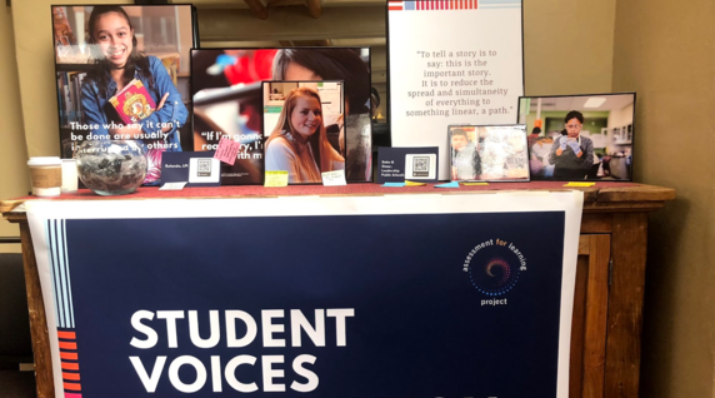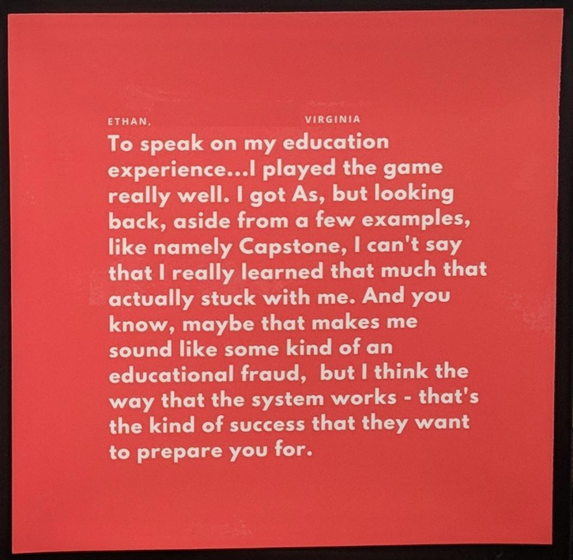Initiatives
The Full Spectrum of Evidence to Advance Personalized Learning

The Full Spectrum of Evidence Toolkit is now available!
Stories, told in the voices of students themselves, can validate quantitative metrics of personalized learning, demonstrating that they reflect important changes in students' learning and their beliefs about learning. Together the stories and metrics build a more complete evidence base for next gen, personalized learning.
In January 2020, the Leon Lowenstein Foundation awarded NGLC a one-year, $235,000 grant to create and distribute a "full spectrum of evidence" toolkit and online gallery to help personalized learning* educators accomplish three goals:
- Better articulate the purposes and goals for adopting personalized learning practices, including the science of learning and development along with skill demands of the 21st-century economy
- Identify appropriate measurement strategies, developed or used effectively by leading next gen educators, to gather evidence of the impact of personalized learning practices on students' development of academic and life skills
- Use these measures to influence local stakeholders, drawing in particular on the power of qualitative, narrative data—the voices of students explaining the impact of personalized learning in their own words.
*The Lowenstein Foundation's interests center on personalized learning which NGLC views as an essential element of next gen learning. LEARN MORE
The Toolkit
Building upon our Measures that Matter Most initiative and with the help of partner schools and national research partners including the SoLD (Science of Learning and Development) Alliance, NGLC is producing an online, open-source toolkit. The toolkit contains information, advice, and strategies for gathering, synthesizing, and articulating evidence for the full spectrum of impacts of personalized, next gen learning:
- An overview of types of measures schools should consider for various evidence-gathering purposes and guidance on the uses of each type
- A list of existing instruments for each type of measure and practical tips from educators on using them
- Help in understanding the links between qualitative evidence and quantitative outcomes and guidance on presenting this evidence in compelling ways to stakeholders
- Instructions to create local student voice galleries and a link to an interactive gallery of curated student voices making powerful points about the impacts of personalized, next gen learning on them.
Student Voice Gallery
Working with several schools in our national network, we are using NGLC’s Sound of Learning methodology to curate a library of recordings of students explaining the impact of personalized, next gen learning in their own words. This gallery of student voices illustrates in human terms what quantitative measures of personalized learning really mean, as shown in these two examples from the Assessment for Learning Project's student voices installation:

Users of the toolkit can post their own most compelling student voices, multiplying the effectiveness and breadth of the gallery over time.
Purpose of the Full Spectrum of Evidence Toolkit
Making the transition to personalized learning requires educators to clearly articulate the evidence base, understanding what kind of evidence, for which audiences, are most important.
What kind of evidence? In NGLC’s MyWays and Measures that Matter Most research series, NGLC documented how the most mature next gen schools in the country measure success. We learned that personalized learning requires a broad evidence base that includes not only measures of core academic skills and knowledge but also measures of 21st-century skills, surveys on social-emotional development, measures of implementation, and longitudinal outcomes. For the most part, test-based assessment strategies used to measure core academic outcomes are not suitable for these additional measures, and the science of measurement in these areas is early-stage. We found that choosing appropriate measures for these types of evidence is a challenge and making sense of evidence—especially for non-expert decision-makers—is crucial.
Personalized learning educators are often left hoping for good results on fairly narrow standards-based assessments as the definitive measurement of the success or failure of their efforts. The toolkit provides educators with strategies to address this challenge and offer their stakeholders a more complete evidence base.
For which audiences? Typically, the most important audiences to be persuaded of personalized learning's efficacy and promise are place-based and highly local: school boards determining whether to sustain and expand pilots, district and school leaders deciding among competing priorities, teachers and parents weighing whether they will support and advocate for unfamiliar practices.
These audiences are less interested in national data that is often inconclusive and contradictory and more interested in evidence that answers the question, “Is personalized learning working for our own students, right now?”
In order to persuade these audiences, educators need evidence for personalized learning that is straightforward, understandable, compelling to non-experts, practical to gather, and representative of personalized learning's broad, whole-learner goals. The toolkit provides guidance for collecting and presenting quantitative and qualitative evidence, with student narratives that help their stakeholders understand the impact of their schools' personalized learning efforts.
To carry out this project, NGLC is organizing a cohort of leaders from schools and district with advanced models of personalized, next gen learning to draw from strategies they have developed over the years. We also are undertaking original research with assistance from a team of graduate students from the Harvard Graduate School of Education. The project report, toolkit, and website are scheduled to be released by the end of 2020. For more information, contact the project co-directors Andy Calkins and Tony Siddall.
